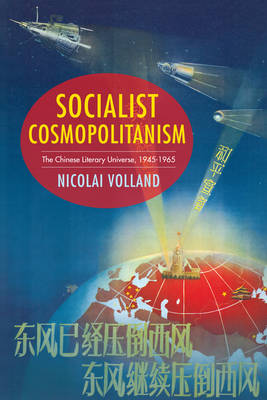
Stock image for illustration purposes only - book cover, edition or condition may vary.
Socialist Cosmopolitanism: The Chinese Literary Universe, 1945-1965
Nicolai Volland
€ 78.97
FREE Delivery in Ireland
Description for Socialist Cosmopolitanism: The Chinese Literary Universe, 1945-1965
Hardback. Series: Studies of the Weatherhead East Asian Institute, Columbia University. Num Pages: 304 pages. BIC Classification: 2GDC; DSA; DSB. Category: (P) Professional & Vocational. Dimension: 229 x 152. .
Socialist Cosmopolitanism offers an innovative interpretation of literary works from the Mao era that reads Chinese socialist literature as world literature. As Nicolai Volland demonstrates, after 1949 China engaged with the world beyond its borders in a variety of ways and on many levels-politically, economically, and culturally. Far from rejecting the worldliness of earlier eras, the young People's Republic developed its own cosmopolitanism. Rather than a radical break with the past, Chinese socialist literature should be seen as an integral and important chapter in China's long search to find a place within world literature. Socialist Cosmopolitanism revisits a range of genres, from poetry and land reform novels to science fiction and children's literature, and shows how Chinese writers and readers alike saw their own literary production as part of a much larger literary universe. This literary space, reaching from Beijing to Berlin, from Prague to Pyongyang, from Warsaw to Moscow to Hanoi, allowed authors and texts to travel, reinventing the meaning of world literature. Chinese socialist literature was not driven solely by politics but by an ambitious-but ultimately doomed-attempt to redraw the literary world map.
Product Details
Publisher
Columbia University Press
Format
Hardback
Publication date
2017
Series
Studies of the Weatherhead East Asian Institute, Columbia University
Condition
New
Weight
28g
Number of Pages
304
Place of Publication
New York, United States
ISBN
9780231183109
SKU
V9780231183109
Shipping Time
Usually ships in 15 to 20 working days
Ref
99-15
About Nicolai Volland
Nicolai Volland is assistant professor of Chinese and comparative literature at the Pennsylvania State University.
Reviews for Socialist Cosmopolitanism: The Chinese Literary Universe, 1945-1965
Nicolai Volland has tackled one of the most provocative issues in modern Chinese and world literature. Chinese socialist literature from the 1940s to the eve of the Great Cultural Revolution has for decades been interpreted solely in terms of propaganda. Volland argues for a more comprehensive understanding of its conception, production, circulation, and reception. Through the prism of socialist cosmopolitanism, Volland offers a new look at issues from translation to transculturation, from the technology of media to the politics of world literature.
David Der-wei Wang, Harvard University This book should be required reading for anyone interested in the development of global literary systems in the twentieth and twenty-first centuries. Volland skillfully sketches the structure of a socialist literary world-system from the Chinese perspective, revealing exciting possibilities for world literature studies. As noteworthy for its sensitive readings of its texts as for its theoretical argument, Volland's book breaks important new ground.
Alexander Beecroft, University of South Carolina Socialist Cosmopolitanism forcefully intervenes in the study of modernity, crosscultural circulation, and Communist cultural institutions. The book contributes new paradigms to the study of modern China, world literature, and literary history and criticism. Volland argues that the Maoist red classics should be understood as part of the trajectory of literary development in China and abroad. Moreover, he shows that the Cold War ideological polarization was accompanied by a strong cosmopolitan impulse, one that has shaped literary works and the concept of literature itself.
Yomi Braester, University of Washington
David Der-wei Wang, Harvard University This book should be required reading for anyone interested in the development of global literary systems in the twentieth and twenty-first centuries. Volland skillfully sketches the structure of a socialist literary world-system from the Chinese perspective, revealing exciting possibilities for world literature studies. As noteworthy for its sensitive readings of its texts as for its theoretical argument, Volland's book breaks important new ground.
Alexander Beecroft, University of South Carolina Socialist Cosmopolitanism forcefully intervenes in the study of modernity, crosscultural circulation, and Communist cultural institutions. The book contributes new paradigms to the study of modern China, world literature, and literary history and criticism. Volland argues that the Maoist red classics should be understood as part of the trajectory of literary development in China and abroad. Moreover, he shows that the Cold War ideological polarization was accompanied by a strong cosmopolitan impulse, one that has shaped literary works and the concept of literature itself.
Yomi Braester, University of Washington
